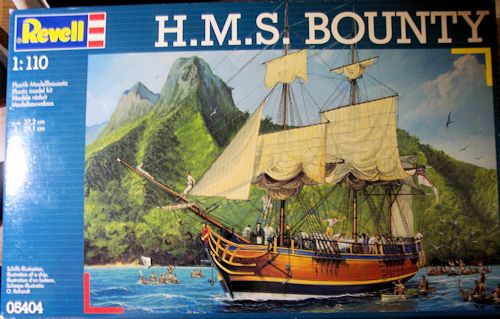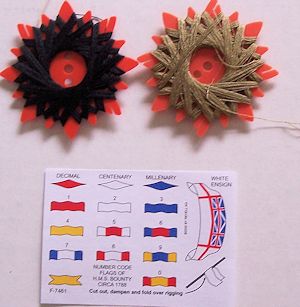
Revell AG 1/110 HMS Bounty
| KIT #: | 05404 |
| PRICE: | $26.99 SRP |
| DECALS: | None: paper flags |
| REVIEWER: | Ray Mehlberger |
| NOTES: |

| HISTORY |
| THE KIT |
The kit comes in a large end-opening type box. It is not shrink-wrapped
and the end flaps are held shut with round pieces of Scotch tape. I am not a fan
of end-opening type kit boxes, as parts always find their way past the end flaps
to be lost. Give me a tray and lid box any day of the week.
The box art shows the Bounty arriving at Tahiti with all hands on deck
waving to natives in canoes.
One side panel says that the kit contains 171 parts. Six paint colors in
the Revell paint line are suggested to complete the kit. Revell cement is also
suggested. This is all said in multiple languages including English.
Features of the kit are listed in the same languages as:
Detailed hull with wood grain.
Detailed deck with pin rails.
Rudder and row boat included.
Four cannon on mounts.
Two anchors.
Detailed masts and yards.
One-piece shrouds.
Sails with canvas texture.
Flag sheet.
Five crew figures.
Display stand and nameplate.
Four color photos of various areas of the finished model are shown here
too.
A one paragraph history of the Bounty in 4 languages (including English)
is on the other side panel. Revell’s German web address is shown above a
copyright date of 2002 and mention of their partner Monogram. The panel says
that the kit was molded in Poland and some printing was done in Germany. More
info about the kit is listed in German, English, French, Nederlands, Svenska,
Italian and Spanish.
That it is an unassembled plastic kit. No paint or cement is included.
The kit is in 1/110th scale and 37.2 cm long. The instructions are pictorial and
multilingual and provide precise assembly instructions. The kit is suitable for
ages 10 to adult.
Seeing the complexity of this kit, I would put the bottom age much
higher.
A color photo of Revell paints, cement and a rudimentary air-brush is
shown. A list of skill levels (1 to 5) is shown. This kit is designated as a 5,
which means “Difficult with over 150 parts, requiring a very high level of
building skill”.
Inside the box is 2 cello bags of parts.
(Ray did not provide a photo or scan of the sprues. Ed)
One bag holds a bunch of chopped up sprues of parts and some loose one
molded in dark brown.
 A
second cello holds a long white sheet of vacuformed sails, that will need to be
cut out with a scissors Also in this bag is the sheet of flags and pennants that
will also need to be cut out with scissors, a spool of black thread, a spool of
brown thread and a length of white thread.
A
second cello holds a long white sheet of vacuformed sails, that will need to be
cut out with a scissors Also in this bag is the sheet of flags and pennants that
will also need to be cut out with scissors, a spool of black thread, a spool of
brown thread and a length of white thread.
The instructions complete the kit’s contents. It consists of a unbound
booket printed on newsprint type paper in 8 ½” x 12” page format and is 19
pages long.
Page 1 says it was printed in Poland and the copyright date of 2002 is
again mentioned. A black and white photo of the model made up is at the top of
the page, followed by the history of the Bounty in multiple languages. Revell’s
address in Germany is provided at the bottom of the page along with their
telephone number there and their web address.
Pages 2 and 3 is CAUTIONS and WARNINGS in 18 languages.
Page 4 is READ BEFORE YOU START instructions in the 18 languages.
Page 5 begins with international assembly symbol explanations, followed
by a listing of paint colors suggested to complete the model.
Pages 6 and 7 are the parts trees illustrations. These will only be
partially helpful as the parts are not on what you would call TREES, but are
pretty much chopped up into sprues of a few parts. The instructions are
miss-leading a bit by making you think there are bigger trees. The parts are
numbered on the chopped up sprues, but searching for a part needed is going to
take extra time. Bad move Revell!
Pages 8 to 19 give a total of 56 assembly steps. The last step is for
the 5 crew figures.
Rigging for this kit is complex and not for the faint of heart or
beginning modeler. I am no fan of rigging and avoid sailing ships and biplane
models because of that.
| CONCLUSIONS |
In the right hands of experienced sailing ship modelers with a lot of skill this kit will make up quite nice. I recommend it only to them.
September 2013
I won my kit in a raffle at a recent IPMS contest.
If you would like your product reviewed fairly and fairly quickly, please contact the editor or see other details in the Note to Contributors.